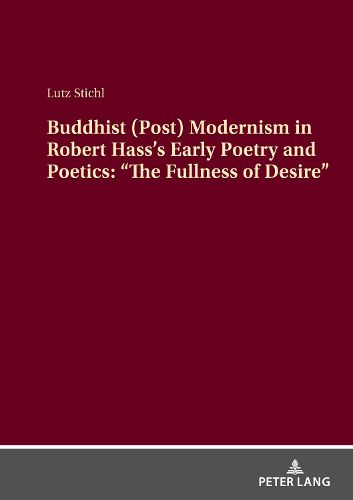Readings Newsletter
Become a Readings Member to make your shopping experience even easier.
Sign in or sign up for free!
You’re not far away from qualifying for FREE standard shipping within Australia
You’ve qualified for FREE standard shipping within Australia
The cart is loading…






This title is printed to order. This book may have been self-published. If so, we cannot guarantee the quality of the content. In the main most books will have gone through the editing process however some may not. We therefore suggest that you be aware of this before ordering this book. If in doubt check either the author or publisher’s details as we are unable to accept any returns unless they are faulty. Please contact us if you have any questions.
This book is the first sustained scholarly effort to analyze reflections of Far Eastern, especially Buddhist-inspired, aesthetics, culture, and philosophy in the poetry and criticism of Robert Hass. Three main concerns of his work can be examined through Hass's reception of Buddhist ideas. Firstly, poetic-ontological perspectives on the self and desire, influenced by the concepts of anatta (non-self ) and tanha (craving). Secondly, appreciations of the sublime in the near-at-hand, i.e., a Buddhist understanding of interdependence. Lastly, Hass's negative capability in the face of philosophical discussions concerning the limits of language. These concerns manifest themselves in an idealistic understanding of the haiku and in a Buddhist-Romantic effort to foster a more intimate relationship with nature. Additionally, they become evident in an ecopoetic desire to combat the abstractions and aberrations of modernity through Far Eastern aesthetics, as well as in a Buddhistderived understanding of paradox as a means of transcendence.
$9.00 standard shipping within Australia
FREE standard shipping within Australia for orders over $100.00
Express & International shipping calculated at checkout
This title is printed to order. This book may have been self-published. If so, we cannot guarantee the quality of the content. In the main most books will have gone through the editing process however some may not. We therefore suggest that you be aware of this before ordering this book. If in doubt check either the author or publisher’s details as we are unable to accept any returns unless they are faulty. Please contact us if you have any questions.
This book is the first sustained scholarly effort to analyze reflections of Far Eastern, especially Buddhist-inspired, aesthetics, culture, and philosophy in the poetry and criticism of Robert Hass. Three main concerns of his work can be examined through Hass's reception of Buddhist ideas. Firstly, poetic-ontological perspectives on the self and desire, influenced by the concepts of anatta (non-self ) and tanha (craving). Secondly, appreciations of the sublime in the near-at-hand, i.e., a Buddhist understanding of interdependence. Lastly, Hass's negative capability in the face of philosophical discussions concerning the limits of language. These concerns manifest themselves in an idealistic understanding of the haiku and in a Buddhist-Romantic effort to foster a more intimate relationship with nature. Additionally, they become evident in an ecopoetic desire to combat the abstractions and aberrations of modernity through Far Eastern aesthetics, as well as in a Buddhistderived understanding of paradox as a means of transcendence.